m (→Trivia: correcting the Arabic script based on in-game reference image) Tag: sourceedit |
Francesco75 (talk | contribs) No edit summary Tag: rte-source |
||
| Line 71: | Line 71: | ||
===Haitian Revolution=== |
===Haitian Revolution=== |
||
In 1791, [[Eseosa]] sentenced fellow Assassin [[Jeannot Bullet]] to death for breaking the first tenet of the Creed.<ref>''[https://acinitiates.com/#!/database/letters-to-the-dead/our-first-setback Assassin's Creed: Initiates- Letters to the Dead]''</ref> |
In 1791, [[Eseosa]] sentenced fellow Assassin [[Jeannot Bullet]] to death for breaking the first tenet of the Creed.<ref>''[https://acinitiates.com/#!/database/letters-to-the-dead/our-first-setback Assassin's Creed: Initiates- Letters to the Dead]''</ref> |
||
| + | ===French Revolution=== |
||
| + | In 1793, the [[Assassin Council]] expelled [[Arno Dorian]] from the Brotherhood after he killed some Templars against their will. They considered he compromised the Brotherhood and pursued a personnal vendetta.<ref name="ACU"/> |
||
==History== |
==History== |
||
Revision as of 06:57, 11 June 2015

|
Ezio, my friend! How may I be of service? This article is in desperate need of a revamp. Please improve it in any way necessary in order for it to achieve a higher standard of quality in accordance with our Manual of Style. |

The Assassin insignia
- "Nothing is true, everything is permitted."
- ―The Creed's maxim.[src]
The Assassin's Creed, often referred to as the Creed, was the code and guiding philosophy of the Assassin Order, upheld from at least the High Middle Ages until the modern era. It restricted unnecessary slaughter of innocents, preserved the reputation of oneself and of the Order, and was meant to create peace, not only within the world, but within the individual.
The Assassins had been handing the Creed down orally from generation to generation, ensuring that its message was delivered to and upheld by every member of the Assassin Order. Al Mualim, one of the Mentors of the Order, once remarked that "[they] are nothing if [they] do not abide by the Assassin's Creed."
In the ancient Codex of Altaïr Ibn-La'Ahad, it was stated that the Creed cannot be killed, even if all of its followers were. He went on to explain that the Creed was an idea, and even if all records of it were destroyed, it could eventually be reinvented by another.
The three tenets
The Creed mainly emphasized three simple moral tenets that focused on ensuring a successful mission, mastery of emotions, and the safety of the Brotherhood.[1]
Stay your blade from the flesh of an innocent
- "I would not have drawn attention to us. I would not have taken the life of an innocent."
- ―Malik Al-Sayf at Solomon's Temple.[src]
The goal of the Assassins was to ensure peace in all things. The Assassins believed that political assassinations and the death of the corrupt would bring peace and a true sense of security to the common people. Slaying innocents and civilian bystanders who did not need to die could spread strife and discord, in addition to ruining the name of the Assassin Order itself.[1]
Hide in plain sight
- "Let the people mask you such that you become one with the crowd."
- ―Al Mualim.[src]
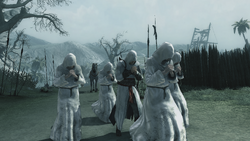
Altaïr blending with a group of scholars
Be unseen. The Assassins' aim was to get close to their target stealthily, and escape just as quickly. In more ancient times, Assassins aimed to perform ostentatious, awe-inspiring assassinations, usually in public.[1]
The greatest illusion from such an assassination was that the Assassin seemingly materialized from nowhere, killed a corrupt public figure, and vanished into the depths of the crowd or environment. If an Assassin was spotted stalking their target, the supernatural effect would be diluted, and it became more difficult for the Assassin to reach his target.[1]
Never compromise the Brotherhood
- "Your actions must never bring harm upon us – direct or indirect!"
- ―Al Mualim.[src]
The actions of one must never bring harm to all. If an Assassin failed in his or her duty, and was captured or chased, he or she must never commit any action or say anything that could be tied back to the Brotherhood, or bring harm to any member of it.[1]
The three ironies
- "Do we bend the rules in service to a greater good? And if we do, what does it say of us?"
- ―Altaïr's Codex, page 4.[src]
The three great ironies were observations that described the contradictions between the Creed, and the actions of the Assassins who followed it. They were:
- The Assassins seek to promote peace, but commit murder.
- The Assassins seek to open the minds of men, but require obedience to rules.
- The Assassins seek to reveal the danger of blind faith, yet practice it themselves.
Though seemingly hypocritical, the ironies did not undermine the Assassins' cause. Rather, they demonstrated the way in which they embraced contradiction, "that one may be two things – opposite in every way – simultaneously."[2]
The Maxim
- "Our Creed does not command us to be free. It commands us to be wise."
- ―Altaïr Ibn-La'Ahad.[src]
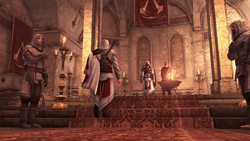
The Initiation ceremony in Rome
"Nothing is true; everything is permitted" was the Creed's maxim and primary guideline.[1] The phrase was created during the 11th century by Hassan-i Sabbāh, the first recorded leader of the Assassin Order.
Ezio Auditore da Firenze once spoke of the maxim at length with Sofia Sartor, who found it rather cynical. However, he told her that the maxim was not a doctrine to be followed, but merely an observation of the world.[3]
In detail, he explained that "To say that nothing is true, is to realize that the foundations of society are fragile, and that we must be the shepherds of our own civilization. To say that everything is permitted, is to understand that we are the architects of our actions, and that we must live with their consequences, whether glorious or tragic."[3]
This maxim was spoken by all Assassins present at every new Assassin's induction into the Order, and in its original Arabic by Ezio as he presided over each ceremony.[4]
Penalty for disobedience
Middle Ages
- "Your selfish act beneath Jerusalem placed us all in danger! Worse still, you brought the enemy to our home! Every man we lost today was lost because of you!"
- ―Al Mualim reprimanding Altaïr.[src]
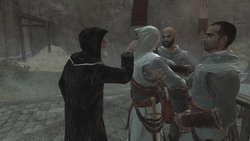
Al Mualim forcefully reminding Altaïr of the Creed
On most occasions, the breaking of one or more of the tenets of the Creed led to the execution of the involved Assassin, though there have been exceptions.[1]
In 1191, Altaïr broke all three tenets during an important mission at Solomon's Temple. By murdering an innocent (an old man who he thought could have alerted the guards), and revealing himself to Robert de Sable, Altaïr inevitably led the Templars back to Masyaf, jeopardizing not only his own safety, but the livelihood of the entire Brotherhood.[1]
Upon his return to Masyaf, Altaïr was publicly chastised and executed via stabbing as punishment by his Master. However, the execution was only an illusion, as Al Mualim wished to grant him a second chance. Instead, Altaïr was merely stripped of all his weapons and equipment, and demoted to the lowest rank of novice, forced to re-earn his rank through the Hunt for the Nine.[1]
Following his return from exile, Altaïr decided to eliminate those of Abbas Sofian's followers whom have compromised the Brotherhood by harming civilians, while leaving alive those that still lived by the Creed.[3]
Renaissance
- "Our tenets are clear. One of our brothers has decided to disobey them and must pay with his life."
- ―An Assassin of Jerusalem.[src]
In 1498, Perotto Calderon also broke the tenets of the Creed out of his love for the Templar Lucrezia Borgia and their newborn son. He broke his cover as a spy amongst the Borgia, compromising the Brotherhood in the process, and killed several of his fellow Assassins in an effort to steal the Shroud of Eden they protected, which he thought could cure his child's deformities.[5]
Though he was successful, a team of Assassins later tracked Perotto down, and executed him as punishment.[5]
While in the Ottoman Empire during the early 16th century, one of Ezio's apprentices broke the first tenet after mistaking a cleric for the Templar Cyril of Rhodes and rashly assassinating him. Instead of punishing him, Ezio ordered to reflect on his mistake and gave him the chance to redeem himself when they confronted Cyril again.[3]
During this time, an Assassin of Jerusalem broke the Creed, and the Ottoman Assassins were asked to intervene. Despite his treachery, the other Assassins of his guild asked that he be executed covertly with a crossbow.[3]
Haitian Revolution
In 1791, Eseosa sentenced fellow Assassin Jeannot Bullet to death for breaking the first tenet of the Creed.[6]
French Revolution
In 1793, the Assassin Council expelled Arno Dorian from the Brotherhood after he killed some Templars against their will. They considered he compromised the Brotherhood and pursued a personnal vendetta.[7]
History
Middle Ages
- "Though I ask my brothers now to abandon their rituals, I do not ask that they abandon the Creed. THIS is what makes us Assassins. Not the removal of a finger. Not a false promise of paradise. Not the prohibition of poison. Our duty is to the people, not to custom."
- ―Altaïr's Codex, page 6.[src]
After the shame of his demotion, Altaïr more closely followed the Creed by never killing anyone other than guards or his assigned assassination targets, and remaining discreet as he performed his investigations. He was also careful to never compromise the Brotherhood, by avoiding Assassin bureaus when under pursuit.[1]
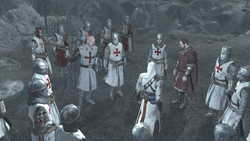
Altaïr confronting Richard and Robert
Nevertheless, Altaïr unknowingly broke the third tenet after dispatching eight, highly-ranked Templars. Upon deducing his mission, Robert de Sable hoped to trick Altaïr into inadvertently allying two opposing forces.
Since the targets were of both Saracen and Crusader origins, their respective leaders, Saladin and Richard I of England, would likely have been more willing to join together in order to combat a considerable, new threat: the Assassins.[1]
Robert attempted to convince Richard to join forces with Saladin in an attack against Masyaf; wherein he planned to recover the Piece of Eden that he had lost to Al Mualim at Solomon's Temple. However, Altaïr's subduing of Robert in front of Richard convinced him not to attack the Assassins, and Altaïr went unpunished for this transgression.[1]
After becoming the leader of the Assassins, Altaïr began bringing the Order underground in extension of the second tenet, believing their obligation was to hide and shape the world in secret. His Assassins disagreed, but Altaïr countered that having them become a public organization had led them to be simply branded as madmen.[2]
Renaissance
- "You are not Vieri, do not become him."
- ―Mario Auditore to Ezio Auditore da Firenze.[src]
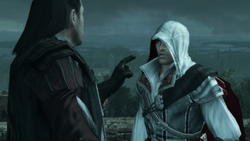
Mario reprimanding Ezio for dishonoring Vieri's corpse
When Ezio Auditore killed Vieri de' Pazzi during one of his early assassinations, he showed disrespect to his corpse, cursing him and calling for his everlasting suffering.
Seeing this as a violation of the Creed, his uncle Mario intervened, chastising the young man for his vengeance, which prevented both the victim and the Assassin from finding the peace that the Order wished each assassination to achieve.[2]
Throughout the remaining course of his life, Ezio followed his uncle's example, showing respect for the dead by closing their eyes and saying "Requiescat in pace" ("Rest in peace").[2]
Ezio unwittingly violated the Creed twice during his later years, killing Tarik Barleti after a case of mistaken suspicion, and then killing many civilians when he started a fire in Derinkuyu to draw out Manuel Palaiologos. Regardless, he espoused the virtues of the Creed to his apprentices, advising them to be patient in planning their assassinations so as to not compromise the Brotherhood.[3]
Golden Age of Piracy
- "For if nothing is true, then why believe anything? And if everything is permitted... why not chase every desire?"
- ―Edward Kenway to the Mentor Ah Tabai, 1722[src]
During the 18th century in the West Indies, the pirate Edward Kenway, upon first hearing of the Creed, used it to justify his selfish pursuit of gold and glory - in his words, "thinking what I like and acting how I please" - even though the Assassins he came into contact with advised that he was misinterpreting its meaning. When Kenway informally joined the Brotherhood in 1720, he expressed his new belief in the Creed to the Mentor Ah Tabai; that it was only a first step to understanding, and not its final form.[8]
Edward's ally and fellow Assassin Mary Read, when telling Edward of the Creed, said that it did not call for the Assassins to act or submit, but to be wise and to choose for themselves when and how to act.[8]
American Revolution
- "Assassins are meant to be quiet. Precise. We do not go announcing conspiracies from the rooftops to all who pass by!"
- ―Achilles Davenport to Connor.[src]
During the American Revolutionary War, Connor allied himself with the Continental Army and became close friends with George Washington. However, his mentor Achilles deplored the idea of telling Washington of the Assassins and Templars, as he felt the Assassins should be a secretive group.[9]
On the other hand, Connor's Kanien'kehá:ka upbringing, which taught him compassion and respect for all living things, led him to extend the first tenet of the Creed to trying to spare the Templars, including William Johnson and his father Haytham Kenway. Achilles had to repeatedly remind his protege that the Assassins deemed it necessary for people like them to die.[9]
Achilles warned against Connor's hope to reconcile with his father, the Colonial Grand Master.[9] After killing his father, Connor chose to compromise in a small way by acknowledging Haytham was right about human nature, but would hope for a better future instead of lapsing into following Templar logic.[10]
Modern times
Though an Assassin in his own right, Desmond Miles mostly adhered to the Creed in order to maintain synchronization with his ancestors, whose lives he observed through the Animus.[1]
He did, however, follow the second tenet to a certain extent before his incarceration at Abstergo Industries, and was careful about hiding his identity. For years, he was able to bypass Templar detection by avoiding the use of his real name or of credit cards, and was only caught after giving fingerprints when applying for a driver's license for his motorcycle.[1]
Trivia
- In Assassin's Creed, Altaïr can break the third tenet without suffering desynchronization, by killing the Masyaf guards.
- Similarly, after completing the main storyline of Assassin's Creed, civilians can be killed without losing synchronization.
- The exact phrase "Nothing is true; everything is permitted" was taken from the novel Alamut by Vladimir Bartol, a book that served as a primary inspiration for Assassin's Creed. In it, the maxim was the highest truth of the Ismaili, the sect of Islam that gave rise to the historical Hashashin.
- The maxim of the Creed was translated and used in both Assassin's Creed and Assassin's Creed II, in the words exchanged with the final target. "Laa shay'a waqi'un moutlaq bale kouloun moumkine" was spoken by Altaïr to Al Mualim, and "Nulla è reale, tutto è lecito" was spoken by Ezio to Rodrigo Borgia.
- The correct English-to-Arabic translation of "Nothing is true, everything is permitted" is "La shay' haqiqah, koulo shay' moumkin". The currently used translation actually means "Nothing is an absolute reality, all is permitted."
- "ليس هناك ما هو صحيح، فكل شيء مباح" is an accurate translation in Arabic script.
- Similarly, the correct English-to-Italian translation is "Niente è vero, tutto è permesso." The translation spoken by Ezio actually means "Nothing is real, all is allowed".
- The Arabic translation of the maxim was still used in induction ceremonies during the Renaissance; by Mario Auditore during the induction of Ezio Auditore, as well as by Ezio for the Roman Assassin apprentices.
- In Assassin's Creed: Revelations, the doors to the library of Altaïr Ibn-La'Ahad were engraved with lines in an Arabic script, which read: إتق دم البريء - لآ شيء مطلق بل الكل ممكن - إختبئ وسط الزحام - إختبئ وسط الزحام and نحن من ائتمنك - لأ تخن من ائتمنك. These translated into: "Revere the blood of the innocent - Nothing is absolute, everything is possible" - "Hide in the midst of the crowds - Hide in the midst of the crowds" and "We are the ones who have entrusted you - Do not betray our trust", which paraphrased the tenets of the Creed and its maxim.
References
- ↑ 1.00 1.01 1.02 1.03 1.04 1.05 1.06 1.07 1.08 1.09 1.10 1.11 1.12 1.13 Assassin's Creed
- ↑ 2.0 2.1 2.2 2.3 Assassin's Creed II
- ↑ 3.0 3.1 3.2 3.3 3.4 3.5 Assassin's Creed: Revelations
- ↑ Assassin's Creed: Brotherhood
- ↑ 5.0 5.1 Assassin's Creed: Project Legacy
- ↑ Assassin's Creed: Initiates- Letters to the Dead
- ↑ Cite error: Invalid
<ref>tag; no text was provided for refs namedACU - ↑ 8.0 8.1 Assassin's Creed IV: Black Flag
- ↑ 9.0 9.1 9.2 Assassin's Creed III
- ↑ Assassin's Creed: Forsaken
